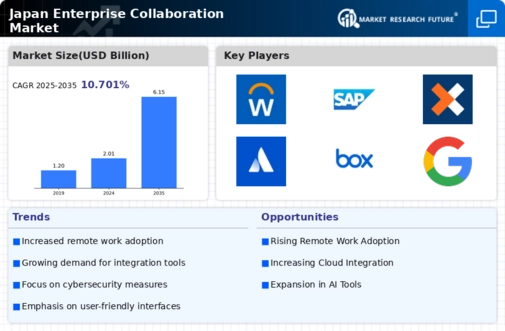Rise of Hybrid Work Models
The emergence of hybrid work models is reshaping the Japan enterprise collaboration market. As organizations adapt to new work environments, there is a growing need for tools that facilitate seamless collaboration between remote and in-office employees. Recent surveys indicate that over 60% of Japanese firms are adopting hybrid work strategies, which necessitate robust collaboration platforms to ensure effective communication and project management. This shift is driving demand for solutions that support real-time collaboration, file sharing, and virtual meetings. Consequently, the Japan enterprise collaboration market is poised for growth as companies invest in technologies that enable flexible work arrangements and enhance team collaboration.
Advancements in Cloud Technology
Advancements in cloud technology are significantly influencing the Japan enterprise collaboration market. The shift towards cloud-based solutions allows organizations to access collaboration tools from anywhere, facilitating real-time communication and project management. Recent statistics reveal that the cloud services market in Japan is projected to reach approximately 2 trillion yen by 2025, underscoring the growing reliance on cloud technologies. This trend is particularly beneficial for businesses seeking to enhance their collaboration capabilities without the burden of extensive IT infrastructure. As cloud adoption continues to rise, the Japan enterprise collaboration market is likely to experience accelerated growth, driven by the demand for scalable and flexible collaboration solutions.
Increased Focus on Employee Engagement
Employee engagement has emerged as a critical focus for organizations within the Japan enterprise collaboration market. Companies are increasingly aware that fostering a collaborative environment is essential for enhancing employee satisfaction and productivity. Research indicates that engaged employees are 17% more productive, prompting businesses to invest in collaboration tools that promote teamwork and communication. This trend is particularly relevant in Japan, where traditional hierarchical structures are evolving towards more inclusive and participatory work cultures. As organizations prioritize employee engagement, the demand for innovative collaboration solutions is expected to rise, further driving growth in the Japan enterprise collaboration market.
Growing Demand for Digital Transformation
The Japan enterprise collaboration market is experiencing a notable surge in demand for digital transformation solutions. Organizations across various sectors are increasingly recognizing the necessity of adopting digital tools to enhance operational efficiency and collaboration. According to recent data, approximately 70% of Japanese companies have initiated digital transformation projects, indicating a robust shift towards modernizing their workflows. This trend is driven by the need to streamline communication and improve productivity, as businesses seek to remain competitive in a rapidly evolving market. The integration of advanced collaboration platforms is seen as a pivotal strategy to facilitate this transformation, thereby propelling growth within the Japan enterprise collaboration market.
Government Initiatives Supporting Collaboration Technologies
The Japan enterprise collaboration market benefits significantly from various government initiatives aimed at promoting collaboration technologies. The Japanese government has launched several programs to encourage the adoption of digital tools among businesses, particularly small and medium-sized enterprises (SMEs). For instance, the 'Digital Agency' was established to support the digitalization of public services and private sectors. This initiative is expected to enhance the overall collaboration landscape by providing resources and funding for technology adoption. As a result, the market is likely to witness increased investment in collaboration solutions, fostering innovation and improving inter-organizational communication within the Japan enterprise collaboration market.





















